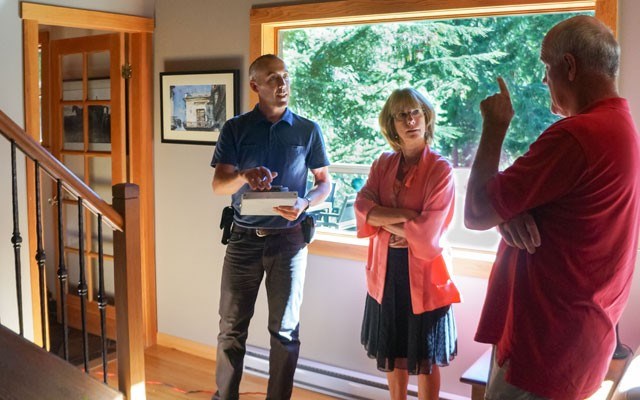Whistler mayor Nancy Wilhelm-Morden took advantage of the municipality's Residential Energy Assessment Rebate Program last week by having her own Whistler Valley home assessed, in an effort to encourage other village homeowners to do the same.
The Resort Municipality of Whistler (RMOW) program provides Whistler residents who undergo an energy efficiency home assessment with a $250 rebate (typical evaluations cost $350).
Wilhelm-Morden said there are three reasons why Whistlerites should follow her lead and have the assessment done.
"One is to reduce energy consumption by making homes more airtight and energy efficient," she said. "The second reason is to save money... and the third reason is to reduce green house gas emissions."
Whistler residents spend approximately $20 million a year on home energy bills, which represents close to one third of the total community energy consumption. Homes in the village emit around 12,000 tonnes of greenhouse gas emissions each year.
Information from the mayor's office shows in the first few weeks of the rebate program, 12 Whistler homes were assessed, including the mayor's. Another five home assessments are scheduled for the second and third weeks of September — the program began on Aug. 5.
For newly built homes, evaluations have been completed for one single-family home and one multi-family building.
Previously, Wilhelm-Morden told Pique the rebate program could accommodate about 85 homeowners.
The mayor's Sept. 4, almost three-hour evaluation, was typical of the process for all homeowners. Certified energy advisor Luke Dolan walked around and checked the energy efficiency of the mayor's 3,500-square-foot, 1979 home by looking at her windows, heating, hot water tank and the insulation levels in the walls, ceiling, attic and crawlspace.
The evaluation determines the amount of heat loss from each part of the house and estimates energy consumption.
Dolan also performed a blower door airtightness test that involved closing all the doors and windows and then placing a giant fan in the entrance doorway. The test simulates a 50-kilometre wind blowing on the home to see how airtight the building is.
Dolan entered all the results into an energy-simulation computer program that generated an energy rating for the house.
He then recommended energy upgrades that would improve the energy efficiency of the mayor's home.
Dolan said that with a typical late-1970s Whistler home, air leaks and improper insulation in crawlspaces are often issues.
"A lot of people think (the crawlspace) doesn't matter because it is below the floors, so they don't really focus too much attention on it," he said.
But a drafty crawlspace is pretty simple to fix.
"Spray foam... will help 'air seal' the crawlspace, as well as add insulation, therefore helping to stop cold air from entering the space, or from heat escaping," Dolan said.
He added that new homes in Whistler are well insulated, but they are often drafty due to air leaks through doors and windows.
Suggestions for typical energy-saving upgrades run the gamut, depending on the home.
"It could be replacing a new furnace, it could be putting new windows in, it could be insulating a crawlspace," Dolan said.
He added that an energy assessment could show homeowners how to reduce energy consumption by 40 per cent or more.
Certified energy advisors, like Dolan, also fill out all the paperwork necessary for the homeowner's rebate.
Wilhelm-Morden said she was happy she had the evaluation done on her home.
"It was really interesting," she said. "Our house performed pretty well."
The mayor said she plans to make the changes Dolan suggested for her home later this fall.
For more information on the rebate program, go to www.whistler.ca/powerdown.
For a home evaluation, contact a Sea-to-Sky certified energy advisor.
A list of advisors is available on the Canadian Association of Certified Energy Advisors website at www.cacea.ca/whistler-sea-sky/ or by contacting Ted Battiston, the municipality's manager of special projects, at 604-935-8205.




